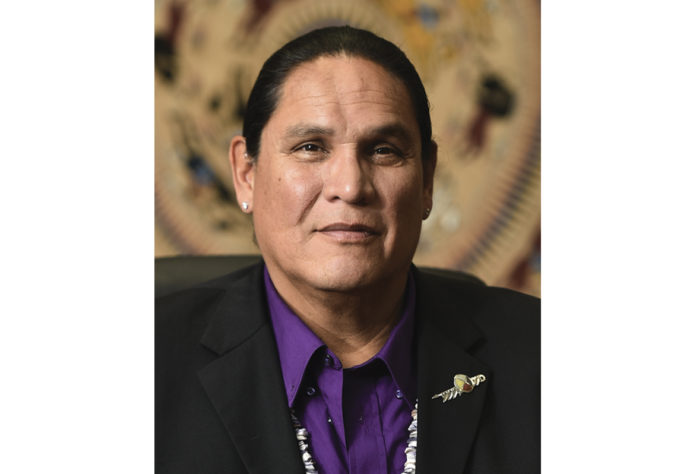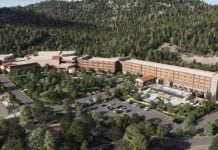by Ernest L. Sevens, Jr.
This month, Congress passed the historic Infrastructure Investment and Jobs Act that seeks to transform our nation’s infrastructure, while work continues to pass the Build Back Better bill to address the crisis of climate change and strengthen support for working families.
From Indian Country’s perspective, these policy priorities are a welcome focus. For much of the past decade, the National Indian Gaming Association has worked to educate Congress about the longstanding infrastructure needs of tribal communities. For most of the past two centuries, tribal governments were left on their own to navigate these challenges with little help from the federal government, despite the government’s treaty and constitutional obligations to tribal nations.
Despite the misguided stereotypes that tribes with casinos equal wealthy Indians (and not in need), the truth is those tribal gaming revenues are responsible for protecting and preserving the general welfare of tribes striving for self-sufficiency through these gaming enterprises in Indian Country. Simply put, gaming revenues fund tribal government operations and programs.
This COVID-19 pandemic spared no one, and the impacts hit tribes. Early on in this pandemic, gaming tribes proactively chose to close their casino operations to help lessen the spread of COVID-19. This meant that critical revenue was lost from the gaming operation, and today, many tribes continue to struggle. This pandemic has been met with devastating challenges, including tribes with large market casino operations, small market casino operations, and especially tribes who are not operating gaming facilities. While many are working their way back from this pandemic, many more continue to struggle. Without a doubt, the passage of this bill will help address the long-term need of Indian Country.
We have repeatedly shared that Indian Country’s infrastructure backlog is estimated to stand at more than $50 billion, covering the entire range of basic structures and systems. The COVID-19 pandemic laid bare these shortfalls. Overcrowded homes, substandard health facilities, and broken water systems all contributed to spreading the virus in Native communities. As schools closed, the lack of broadband made it impossible for many students to engage in remote learning.
In addition to being a direct health threat to Native communities, these longstanding infrastructure disparities have stalled economic development in Indian Country for generations.
The National Indian Gaming Association has expressed wide support for the bipartisan infrastructure framework. The package provides more than $11 billion to tribal governments to build and improve water and sanitation facilities, Indian Country’s roads, bridges, and transit programs, and further expand broadband access on Native lands.
The $1.2 trillion Infrastructure Investment and Jobs Act represents the largest single federal investment in infrastructure in American history. The U.S. Senate passed the bill by a wide bi-partisan margin on August 10, 2021, and the House took a final vote and passed the legislation on November 5th. Tribes nationwide look forward to using these resources to build a more resilient future for our communities and our future
generations.
Negotiations over the President’s related priorities to strengthen working families and address the climate crisis also nears agreement. The package known as the Build Back Better will potentially go to a vote in the House by mid- November, likely followed by Senate revisions. Senate Majority Leader Chuck Schumer has indicated he hopes to pass the Senate’s version of the bill after approval from the House, and before Thanksgiving. I urge our tribal communities to engage with their representatives and let them know how desperately in need we are for improved social services.
President Biden unveiled the framework for this plan on October 28th. The plan seeks to transform domestic social policies to address education, healthcare, and the climate crisis. According to the White House fact sheet on the plan, “The Build Back Better Act will create millions of good-paying jobs, enable more Americans to join and remain in the labor force, spur long-term growth, reduce price pressures and set the U.S. on course to meet its clean energy ambitions.”
Some topline details in the President’s plan include the following: establishing universal preschool for all children aged 3 and 4 years old (including on reservations); increasing funding for elder care and home care worker programs (including direct payments to tribal health elder services); strengthening the Affordable Care Act and Medicare; investing in affordable housing; supporting funding for underserved colleges – including tribal colleges and universities; and providing more than $500 billion in investments to combat climate change.
Indian Country has lagged far behind the rest of the nation in each of these critical issue areas. The staggering impacts of the COVID-19 pandemic on Native Nations laid bare the longstanding shortfalls in the Indian healthcare system. The lack of housing was a primary reason the virus spread throughout tribal communities. And from the climate change perspective, Native communities from all corners of Indian Country have been disparately impacted from wildfires, Superfund and related toxic waste sites, and rising waters that have forced many tribal communities to seek higher ground to survive.
For much of the past century, federally approved acts of environmental injustice have destroyed our sacred places and cultural landscapes and continue to threaten the air, water, and environmental health of Native communities. We know first-hand the devastation of unchecked environmental damage.
Indian Country supports the goals of the Bipartisan Infrastructure Framework and the Build Back Better plan. These initiatives will help address decades of unmet need and build resilience in Native communities nationwide while providing a brighter future for generations to come.
As Congress closes in on a deal to advance the Build Back Better Plan to final passage, the National Indian Gaming Association will continue to work with Congress and the Administration in coordination with our Member Tribes and tribal organizations to ensure the final products meet the unique needs of Native Nations. I hope you and your family enjoy the changing seasons and I believe these new federal initiatives will spark a fundamental change in the social well-being of our reservation citizens.
Ernest L. Stevens, Jr. is Chairman of the National Indian Gaming Association. He can be reached by calling (202) 546-7711 or visit www.indiangaming.org.














































